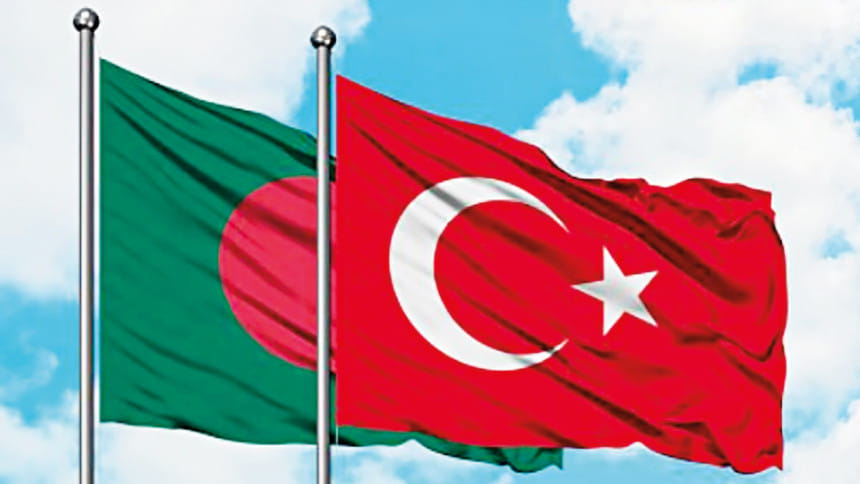A friendship for the ages

Bangladesh and Türkiye's relationship has been deeply tied together in the history of both countries. This story of friendship and partnership dates back to before both countries had even emerged as modern nation-states.
If one where to look back, they would see that Kazi Nazrul Islam, Bengal's rebel poet, wrote in praise of Mustafa Kemal Atatürk's bravery in the Turkish War of Independence: "To chase out the invading aggressor/ We need, indeed, a fearless Kemal/ Kemal, what a wonder you've worked!/ Ho Ho Kemal, what a wonder you've worked!" (Kemal Pasha, 1921).
After the Independence of Bangladesh, the relationship between the two countries grew even further, as Türkiye recognised Bangladesh as an independent state in 1974. Throughout time, their partnership has continued to be tied deeper. Now, Bangladesh and Türkiye cooperate in many areas including trade, defence, foreign investment and education.
Currently, the two-way annual trade between Bangladesh and Türkiye has crossed the $1 billion threshold, with both countries aiming to reach the $2 billion mark in the next couple of years. They plan to do this through increased cooperation among economic actors, simplification of trade rules, and diversification of trade products.
In July this year, the two countries have launched Bangladesh-Türkiye Business Forum (BTBF) in Dhaka which will promote better economic and trade relations between Türkiye and Bangladesh.
The two countries also stepped up their defence ties, with Bangladesh signing several defence purchase agreements with Türkiye in the last couple of years. According to local experts, Turkish military products will equip the Bangladesh Armed Forces with NATO standard air, land and naval warfare capabilities.
If there is one thing that remains true in this world, it is that the mark of a true ally can be seen during moments of crisis. As such, it is clear to see why Türkiye has been such a great partner for Bangladesh, as they stepped forward with unconditional support to Bangladesh in regards to the Rohingya issue at various multilateral fora such as the UN, ICJ, G20, and OIC.
Turkey has also been providing humanitarian aid—particularly in the field of health, education and rehabilitation—to Rohingya refugees and host communities in Bangladesh. In 2018, a 50-bed field hospital—run by Turkish government organisation AFAD—was inaugurated at Rohingya camp No. 9, in the Palangkhali union under Ukhia upazila of Cox's Bazar. The hospital was completely rebuilt after the massive fire in the camps in March 2021. Additionally, a soap factory and sewing atelier employing Rohingyas are run by the Turkish Diyanet Foundation, a Turkish development organization.
While both Bangladesh and Türkiye are Muslim majority countries, their ties run deeper. People of both nations follow Sufism and there is a wide appreciation of the works of famous Turkish poet and Sufi mystic, Mawlana Jelaleddin Rumi among Bangladeshis.
Turkish television programmes are also very popular in Bangladesh. Popular Turkish historical dramas such as "Dirilis: Ertugrul" (Resurrection: Ertugrul) and "Muhtesem Yuzyıl" (Magnificent Century) have even been dubbed in the local language for Bangladeshi audiences.
Turkey is also a popular tourist destination for the people of Bangladesh. This year, Istanbul was one of the top destinations for Bangladeshi tourists.
On average, in recent years, 600 Bangladeshi students go to Turkish universities for their higher education. The government of Türkiye regularly provides scholarships to Bangladeshi students to study in their most prestigious universities.
There is the potential to take bilateral relations between Türkiye and Bangladesh to even greater heights. New avenues of cooperation should be explored to deepen the ties between the governments and private sectors of both countries. The people-to-people contact between the two nations also needs to be promoted to consolidate the gains from the improved relationship.

 For all latest news, follow The Daily Star's Google News channel.
For all latest news, follow The Daily Star's Google News channel. 



Comments